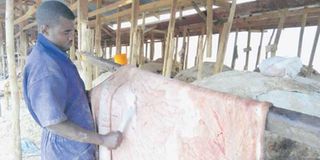Leather industry reels under levy: exporters

Mr Yahya Zabda prepares a hide at Salex Ltd in Arusha. PHOTO|FILE
What you need to know:
- The government imposed 10 per cent export levy of the freight on board (FoB) value of the wet blue leather during the 2015/16 financial year.
Dar es Salaam. Leather exporters are complaining about losses as their customers have shifted to neighbouring countries after Tanzania slapped a 10 per cent export levy on the commodity.
The government imposed 10 per cent export levy of the freight on board (FoB) value of the wet blue leather during the 2015/16 financial year.
The levy has remained intact despite attempts by exporters of the products to scrap it.
Now exporters say buyers of wet blue leather – who are mostly from Italy, China and India - are now increasingly shifting to Uganda and Kenya to save their money.
They say Kenya and Uganda scrapped the levy.
“Before the imposition of the levy, my company used to export three containers, each with a capacity of 24,000 square feet of wet blue leather per month to Italy, China and India, but since then, we have not exported anything,” Moshi Leather Industry marketing manager Salim Saidi said.
Speaking to The Citizen at the ongoing 42nd Dar es Salaam International Trade Fair, Mr Saidi asked the government to look into the possibility of removing the tax, saying there was a huge stock of wet blue leather that would be damaged if nothing was done.
The deputy minister for Fisheries and Livestock, Mr Abdallah Ulega, said: “I have received all the claims from the stakeholders on the issue and we will work on that as soon as possible.”
He said only six factories process hides and they were inadequate to handle all hides in a country that had a large number of livestock. “The government will provide education to livestock keepers on the importance of valuing their animals and removing the notion that in animals only milk and meat are important. Actually, leather is more important,” he said.
Himo Tanneries and Planters sales official Emmanuel Mangare insisted that the export levy on wet blue leather had dealt a heavy blow on the livestock sector.
He said before the levy, his company used to export 50,000 square feet of hides annually, but currently more than four containers were at warehouses, awaiting customers.
“We have been manufacturing shoes, but the market is very small. We ask the government to look into the possibility of removing the tax for the benefit of the leather industry.”
Experts say millions of cattle are slaughtered for their hides every year in the leather trade. Most leather comes from developing countries such as India and China, where animal welfare laws are either non-existent or not enforced.


